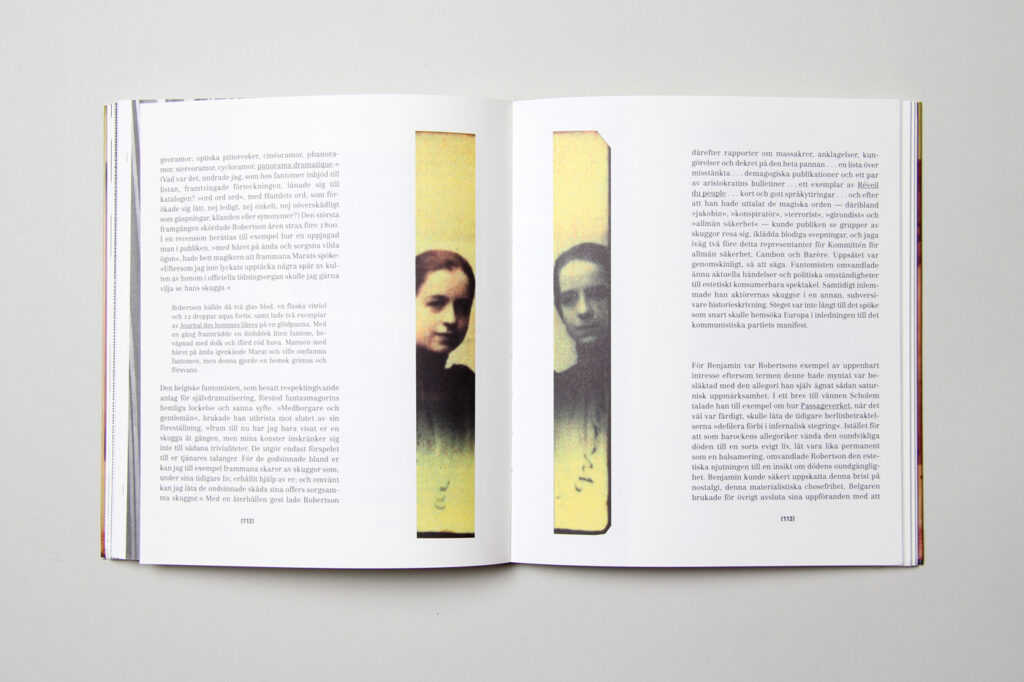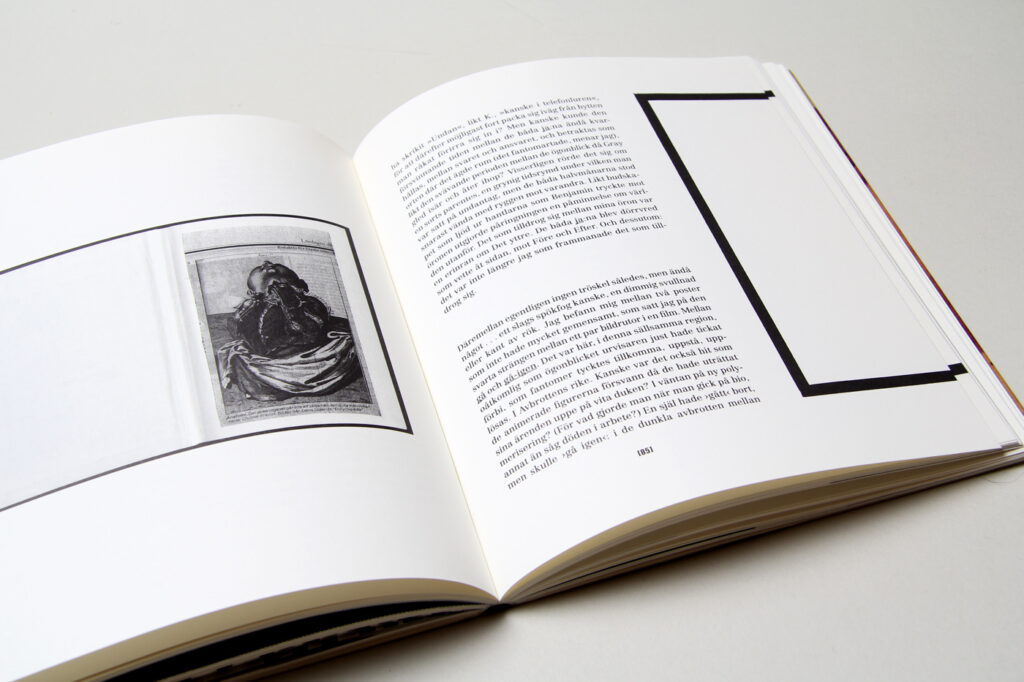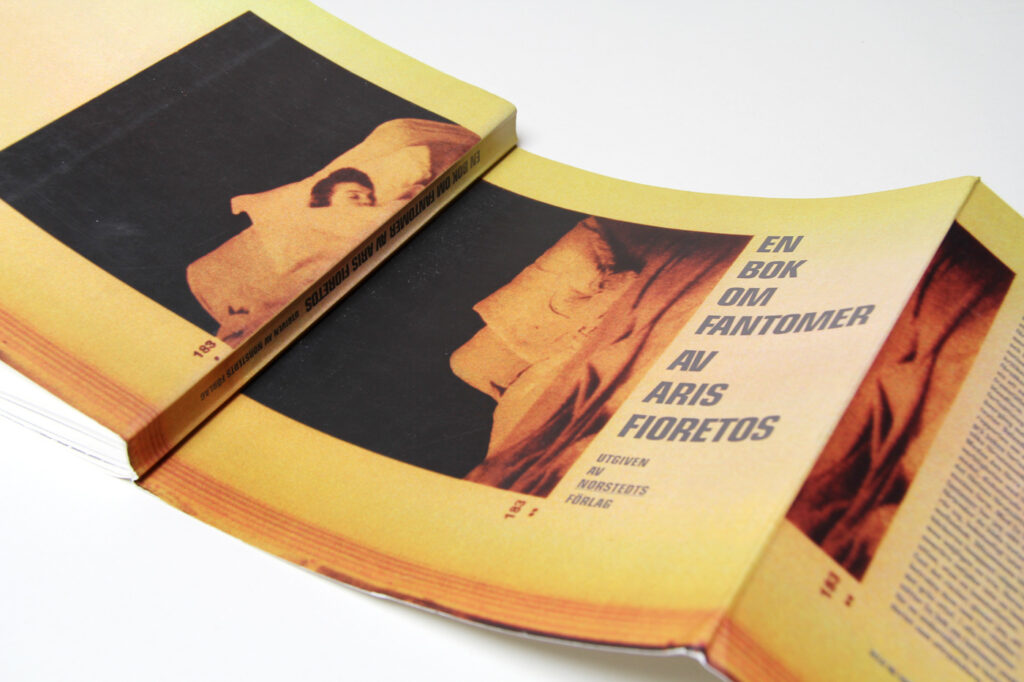










En bok om fantomer:
A Book about Phantoms
Information · Cover · Reviews
Information
Essay · In Swedish · Stockholm: Norstedts, 1996, 159 pages · With images by Sophie Tottie · Cover: Sophie Tottie · ISBN: 91–1–960471–8 · English language rights available · Revised edition in 2024 in Grey Quartet
Cover
Shadows, specters, and mirror spooks, figures of fume, fog, and fuddle, poltergeists, phantasms, djinns, and ether revenants . . . The apparitions of the spectral are multifarious. Containing reflections on phantoms in works of art, literature, and film, A Book about Phantoms discusses eighteenth-century technological inventions such as the phantasmagoria and phantom image, as well as developments within criminology and communications theory. It investigates the realm between life and death, word and image, and treats not only different forms of medial apparition, but also the premises and aporias of mediation as such. Moving from the analogical ghosts found in Gothic literature to the digital phantoms of contemporary films such as The Crow, discussing in the process works by Polidori, Poe, Rathenau, Dreyer, and Kafka, the book provides a pertinent and critical, yet always distinctive and personal, account of the uncanny forms that things and people seem to acquire when they disappear.
This is an essay singular in tone and unusual in substance, sedulously registering the odd moments when thoughts gain shape and bodies dissolve. It discusses the significance of impossible statements such the “I am dead” of Poe’s Mr. Valdemar, treats the perplexities found in Dreyer’s Vampyr, and teases out the implications of Alphonse Bertillon’s portrait parlé. Providing a personal dossier of spirits, shades, and shadows, A Book about Phantoms records visits to realms perceived but uncertain, glimpsed yet vanishing, in which errant figures of dust and oblivion alone seem at home.
A collaboration with Swedish artist Sophie Tottie, who has provided original artwork and also designed the volume, the book offers a phantasmagoria for both the eye and the mind.
Reviews
“The interplay between text and image turns A Book about Phantoms into a very readable reflection on seeing and consciousness in the margins of Western culture, on our endeavor to name the unnamable . . .” — Ingamaj Beck, Aftonbladet
“It so impressive, you just sit there with your mouth open . . .” — Poul Borum, Kvällsposten
“Fioretos moves freely and knowingly between film and opera, image and word, modern philosophy and criminology. In addition, he has the good taste to stage his ruminations as a sort of reconnoitering through the world of phantoms, with a series of narrative techniques borrowed from the world of detective fiction. One discovery leads to the next, the traces converge and diverge, the narrator approaches the solution to the riddle through a series of insights.” — Anders Cullhed, Dagens Nyheter
“Aris Fioretos is, undoubtedly, one of Sweden’s most talented writers, and his trio of books definitively belongs to the most daringly experimential writing that has been published in recent years.” — Johan Dahlbäck, Göteborgs-Posten
“Aris Fioretos’ books have great attraction on me . . . [A Book about Phantoms] is an invisible celebration of the magical ability of writing to create life and meaning beyond its own control — but at the same time, it also mourns the inability of the alphabet to gather what is gray in our existence, the phantomatic, that which will always remain unclarified.” — Stefan Eklund, Borås Tidning
“. . . a relaxed, associative essay, characterized by mostly sublimely nuanced explications. Intellectual rigor is combined with an equally inspiring poetic attentiveness. . . . Exquisitely, [Fioretos] balances between abstract arguments and suggestive metaphors.” — Björn Gustavsson, Bohusläningen med Dals Dagblad
“There is no question that Aris Fioretos is a skilled critic and exquisite interpreter. More remarkable is that he also has such subtle command of poetry. The sudden images and metaphors which structure the text are both poignant and daringly original. . . . A Book about Phantoms mixes high and low, and it is precisely in this mixture of voices that it is at its most effective. Sophie Tottie’s pictorial material appears as examples, too, celebrating the fragment. Photos, newspaper excerpts, and drawings relate subtly to the text, turning the book into a spectral but, at the same time, coherent whole.” — Per-Gunnar Kramer, Göteborgstidningen
“. . . Aris Fioretos, the incomparable. . . . [His book] contains transitions and turns of thought of absolutely dizzying kind — both thematically and intellectually, verbally and poetically.” — Nina Lekander, Expressen
“A Book about Phantoms is the third volume in a trio which began with The Book of Imparting and continued with The Gray Book. Originally marked by privacy and mourning, the trio is now completed with a text characterized by lightness and almost merry openness, without precision ever being lost in the process. Here, Fioretos’s language is more constructive than ever . . .” — Kristina Lundblad, Sundsvalls Tidning
“What do we have here? Some hardboiled hermeneutician or a deadpan deconstructivist?” — Karl Steineck, Helsingborgs Dagblad
“Abstract arguments are followed by the most profane and exquisite similes . . .” — Jonas Thente, Sydsvenska Dagladet